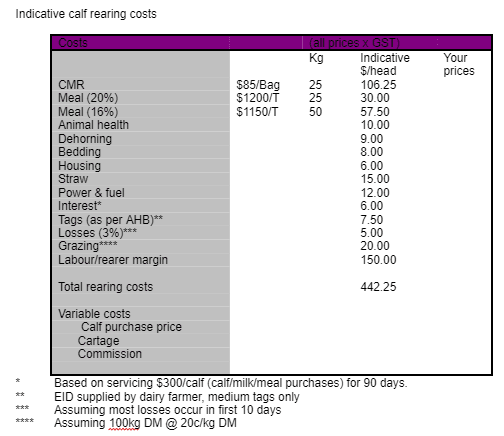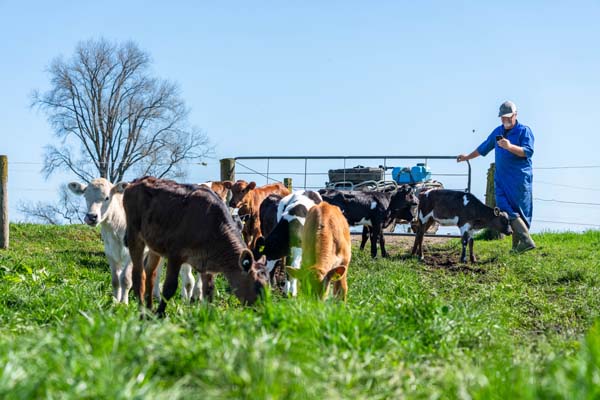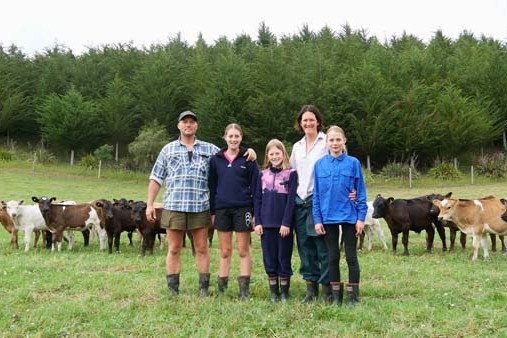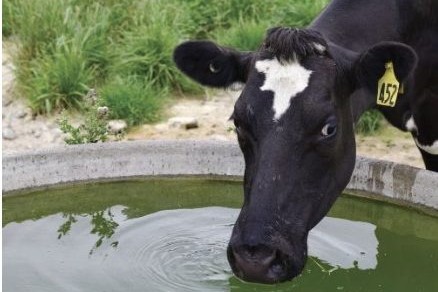What it costs to rear a calf
Paul Muir and staff from On-Farm Research at the Poukawa Research Farm in Hawke’s Bay have been researching calf rearing since 1996. They have put together an update of calf rearing costs for the 2023 season.

Getting calf milk replacer (CMR) prices is challenging as companies hold back to see who sets the price first. For this season, companies bought ingredients on a commodity high and prices will reflect this.
It looks like premium CMRs will range from $80 to $90 a bag plus GST, about $10 less than last year. Whey or non-curding CMRs will be about $75/bag, about $5 less than last year. These are based on tonne rates and don’t include delivery except for reasonable tonnages close to town.
Our recommendations remain the same – feed a premium curding powder for the first few weeks, then switch to non-curding milk powder if you need to cut costs.
Once calves are two or three weeks old, their rumen and immune systems are developing and thus better able to handle non-curding powders.
A simple curd test involves making up 500ml of milk replacer as per the instructions on the bag. Keep at 39C (set the oven and use a thermometer) and then add 5ml of rennet available from many supermarkets. A good curd should occur within 20 minutes. Do the same with blue top milk to see what a really good curd looks like – although milk replacer will never curd as well as whole milk.
A premium CMR at $85 a bag and fed at 125g/litre costs 53 cents/l. At $75/bag a non-curding CMR works out at 47 cents/litre. By comparison, with a current milk solids payout of $8.30/kg, a Friesian cow with a milksolids content of 8% has milk worth 66c/l. Milk from a Jersey cow with milksolids content of about 9.8% will make this milk worth around 81c/l. Increasingly, dairy farmers will switch from vat milk to CMR later in the season.
Calf meals: pricings appear to be up $100/tonne on last year at about $1150 plus GST for 16% protein pellets and $1200 plus GST for 20% protein pellets. There can be discounts of $150/t if you can buy direct and/or in bulk. Because of the uncertainty around supply and cost of imported ingredients in calf meals, few suppliers will guarantee prices beyond June.
Calf prices: Autumn-born calves are sought after; they are often 100kg heavier by summer than spring-born calves and are better able to digest lower-quality summer feed. Limited availability of these calves means May sale prices are about $150 for the better Friesian calves. Spring calf prices reflect supply and demand. Slaughter bottlenecks at peak times may drive the price of rearable spring calves down.
Rearing cost: It is always difficult to provide an accurate indicator of calf rearing costs as every situation is different. Some rearers have ready access to cheaper calves, and/or low-cost whole milk. Larger rearers get better discounts on CMR and calf meals and have economies of scale with labour. Mortality and animal health costs vary. These factors all impact the bottom line.
While the aim is to feed one bag of CMR, small or late calves need more CMR. We have used a CMR price of $85/bag and feeding 25kg/calf which equates to $106.25 CMR per calf. This assumes a casein-based CMR is fed throughout the rearing. However, switching to a budget CMR for the last two or three weeks of rearing could save $5/calf.
Our indicator budget is for a system feeding 75kg of meal – 25kg pre-weaning and 50kg post-weaning. Rearers on limited land areas are likely to feed higher quantities of meal, with grass as a much smaller component of their system. If 75kg of meal is fed, a typical Friesian bull calf will consume about 100kg of grass drymatter between weaning and sale. We have valued this at 20c/kg DM to reflect the lost opportunity cost from grazing other stock. 
We have used a $150 rearer margin to cover labour and profit (up from $130 last year). This means “fixed” rearing cost is about $440/calf. Variable costs of calves, cartage and commission at point of selling need to be added. If the spring calf price is $100, rearers need a net average sale price in excess of $540/calf to be profitable.
For more information www.on-farmresearch.co.nz or facebook – Calf Rearing NZ




